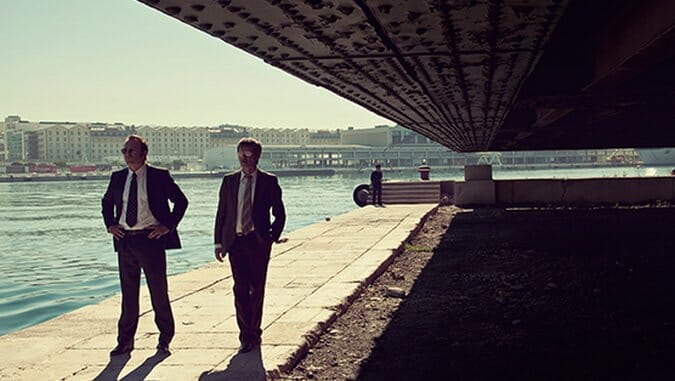The Connection

All of The Connection’s mettle is tested in one scene, which comes smack dab in the middle of its nearly two-and-a-half-hour runtime. Up until that point, the film has attempted to be many things: a gangster thriller; a gritty period piece; a character study of the fine line between good and evil; a blatant Scorsese riff; an obvious homage to The French Connection; a solid go at trying to make Jean Dujardin not incredibly dreamy and charming. And to each and every one of these aims, the film devotes much more than cursory attention. Director Cédric Jimenez wants so badly to make something truly epic—something that lays out, sprawled all over its copious plotting with heavy, melodramatic, historical girth—that everything he does is in thrall to proving he’s got the energy and imagination to take on such an ambition. The Connection is a movie with some serious scope.
But back to that scene: The film begins in Marseilles in 1975, and follows the exploits of two men on opposite sides of the law. Up-and-coming good guy Pierre Michel (Dujardin) is appointed to magistrate in the City’s organized crime unit, tasked with sussing out ringleader Gaëtan “Tany” Zampa (Gilles Lellouche) and then taking down the mob boss’s American heroin trade (affectionately known as The French Connection, natch). Though they represent two functionally different moralities, these characters have a lot in common. They look the same, gesture in the same ways, both need family to keep them sane, both become increasingly obsessed with the other—they’re bound by the laws of cinema to meet. Which they do, of course, somewhere around the middle parts of The Connection, practically dividing the film in two.
Because so much of the film is building to this point, the scene in The Connection in which its foils finally come face to face is one that could have been an astounding piece of work, a place in which all of the film’s many aspirations and aesthetics could come together and begin to really mature. Set on the edge of the road, on the edge of a cliff with a sunset behind, Michel and Zampa glower menacingly at one another, trying to seem simultaneously casual and intimidating should their vague threats not properly convey the fact that they want to destroy everything their opposite knows and loves. But then the scene just sort of happens—the gangster threatens the cop with a few seriously pathetic warning volleys, and the cop responds by looking like he totally doesn’t give a shit about anything. Zampa declares that he is a “businessman,” and instead of their banter taking on a luscious tint of philosophy towards the reality of good and evil, or towards discussing the role of ethics in the throes of modern capitalism, Michel basically just says that he doesn’t think that’s how being a businessman works. He’s a lawman, after all; he’d know.
-

-

-

-

-

-

-

-

-

-

-

-

-

-

-

-

-

-

-

-

-

-

-

-

-

-

-

-

-

-

-

-

-

-

-

-

-

-

-

-








































